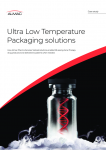Aseptic manufacturers must invest in latest GMP compliance, says UK CMO

Headquartered in Stirling, UK, private contract manufacturing organisation (CMO) Symbiosis offers its clients – a mixture of small/mid-cap biotech and speciality pharma companies - manufacturing of sterile drug products at clinical scale. CEO Colin Mackay spoke to Outsourcing-Pharma.com about the current gap in the market and manufacturing opportunities for firms like Symbiosis.
“Demand for sterile injectable manufacturing is evident to the extent that in 2011 our founders raised private investment during a particularly challenging economic climate to set-up Symbiosis, with the vision to offer a level of customer service not widespread in the market,” he said.
An increased trend to develop oncology and large molecule drugs, coupled with the pull-out of a number of key players, is driving this demand. US aseptic manufacturer Ben Venue Laboratories, for example, closed its doors last year following a long bout of regulatory issues, while a number of firms including SCM Pharma and Aesica have left a hole in the UK sterile injectables landscape.
High demand and low capacity is therefore presenting an “increased commercial opportunity at this time,” said Mackay. “The recent UK pullouts have led to disruption for a number of clinical stage companies in their development plans and Symbiosis is actively working to support as many of those projects as fit with our sterile manufacturing capabilities.”
What’s going wrong?
We asked Mackay what had gone wrong at some of Symbiosis’ UK competitors.
“If sufficient importance isn’t placed on investment in compliance with the latest regulatory guidelines, then things can go wrong,” he said. “A number of factors are at play including, high set-up and maintenance costs for facilities, requirement for specialist expertise, complex process control and validation requirements, and necessity for a quality driven culture.”
He added Symbiosis has invested wisely, and would continue to remain vigilant with respect to changing regulatory requirements, invest in a frequent and constructive relationship with the regulators, and respect the “business-critical” need to comply given that GMP lies at the heart of the firm’s service offering.
“The rules are strict but we believe this is rightly so in the interests of patient safety, which is fundamentally important.”
Continued Outsourcing model
Drug companies like Hikma, Mylan, Sun Pharma and Par Pharmaceuticals have all invested in their own sterile capabilities, but Mackay told us he has not seen any reversion back to in-house production.
“The outsourcing rationale continues to be valid particularly for small/mid-size biopharma who do not have an in-house option.”
Meanwhile large pharma has continued to “reduce in-house R&D spend in parallel with an evolution towards new product pipeline growth through acquisition or in-licensing after Phase I/IIa,” he said, adding Symbiosis has had discussions indicating they are looking to small niche CMOs, attracted to “specialist manufacturing focus and service excellence.”














